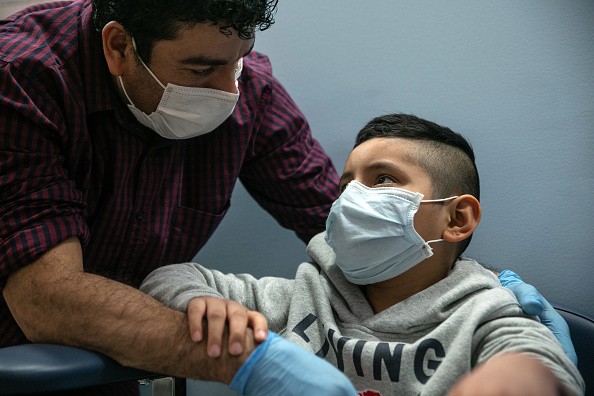More Than 1 Million American Children Diagnosed With COVID-19
More than one million children in the United States had been diagnosed with COVID-19, according to an American Academy of Pediatrics (AAP) report released Monday.
There are at least 1,039,464 children, including infants and teens, in the country who received a positive COVID-19 test as of Thursday.
The data came from the weekly report of AAP in collaboration with the Children's Hospital Association. These two organizations use state health department data on COVID-19 to track pediatric cases in the country.

Dr. Sally Goza, president of the AAP, said the data was both "staggering and tragic."
"We haven't seen a virus flash through our communities in this way since before we had vaccines for measles and polio," she told NBC News.
These new numbers reflect the biggest leap of pediatric COVID-19 cases in the country over one week. Last week, around 112,000 children were diagnosed.
COVID-19 Cases Among Children May Be Higher
COVID-19 affects children differently than adults, so doctors believe the actual number of infections may be much higher. One of the main reasons behind this is because the disease is often mild in children and thus goes undetected.
The Medical News Today noted that most coronavirus cases among children are either asymptomatic or exhibit mild symptoms.
Often, the symptoms are cough, fever, or gastrointestinal problems. But infants less than a year old and have underlying medical conditions will have a higher risk compared to older children.
Severe Complications May Come in Pediatric COVID-19 Patients
Even though COVID-19 often poses little risks to children, there is still room for severe complications.
Data from the Centers for Disease Control and Prevention (CDC) showed over 1,100 children in the U.S. were diagnosed with the multisystem inflammatory syndrome (MIS-C). Twenty of the children have died with MIS-C.
The condition causes inflammation in several organs and often starts after a person has contracted the coronavirus.
"MIS-C can affect almost any organ system of the body, and most kids with MIS-C have been previously healthy," Dr. Dongngan Truong, a pediatric cardiologist, told Deseret News.
She added that cardiovascular is MIS-C's common target.
Dr. Jason Lake, a pediatric infectious disease specialist, said there are about four weeks of delay in acute infection to the onset of MIS-C.
Having already treated 17 children with the condition, he expects that double the cases will be coming in the following weeks, especially with the surge of cases nationwide.
The most common symptoms for this syndrome include fever, stomach ache, vomiting, diarrhea, and rashes.
Dr. Erin Treemarcki, a pediatric rheumatologist, added that MIS-C does not look like an acute COVID-19 infection. But it does look like other infections like autoimmune or autoinflammatory conditions.
Mental Health Issues COVID-19 Brings to Children
Overall, the AAP said there had been 133 pediatric COVID-19 deaths since the start of the pandemic.
It is only a very small number, 0.06 percent, compared to the total number of deaths in the entire country. But the pandemic may also have other impacts beyond physical health.
For example, the AAP is pushing public officials to look into the possible emotional and mental effects of pandemic on children. The AAP is expecting the pandemic to have some long-term impacts on kids' lives.
The stress that comes from being stuck indoors and over-reliance on the internet during this time can be trying for the mental health of children.
Goza said it might be similar to the impact of natural disasters on the mental health of children.
"Most natural disasters have an end, but this pandemic has gone on for over eight months, and is likely to continue to disrupt our lives for many more," Goza noted.
The stress that comes with being stuck indoors and over-reliance on the internet during this time can be trying for the mental health of children.
Goza said it may be similar to the impact of natural disasters to the mental health of children.
"Most natural disasters have an end, but this pandemic has gone on for over eight months, and is likely to continue to disrupt our lives for many more."
Subscribe to Latin Post!
Sign up for our free newsletter for the Latest coverage!
© 2026 Latin Post. All rights reserved. Do not reproduce without permission.














